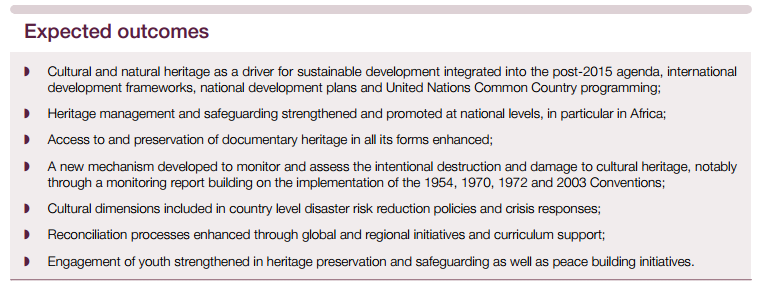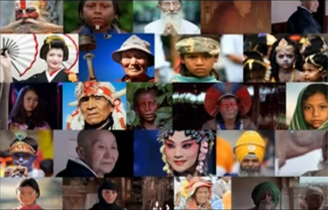37 C/4 - 2014–2021 Draft - Medium-term Strategy
Strategic Objective 7
Protecting, promoting and transmitting heritage
121. Heritage, understood in its entirety – natural and cultural, tangible and intangible, movable and immovable, as well as documentary – constitutes assets inherited from the past that we wish to transmit to future generations because of their social value and the way in which they embody identity and belonging. These assets may be used for promoting social stability, peace building, recovery from crisis situations, and development strategies.
122. Heritage is inextricably linked to the most pressing challenges facing humanity: climate change and natural disasters, loss of biodiversity, safe water, conflicts, unequal access to food, education and health, migration, urbanization, social marginalization and economic inequalities. Heritage is thus essential for promoting peace and sustainable societal, environmental and economic development..
123. UNESCO’s normative framework provides a unique global platform for international cooperation and dialogue. It establishes a holistic cultural governance system within a human rights-based approach, building on shared values, mutual commitments respecting cultural diversity, the free flow of ideas and collective responsibility. The implementation of the Organization’s Conventions, Recommendations, Declarations and its Intergovernmental Programmes engages States in dialogue and cooperation at the international level, thereby facilitating inclusive governance, sharing knowledge and best practices at the policy level.
124. This cooperation platform is conducive to leveraging the contribution of cultural and natural resources to sustainable development through the promotion, protection and safeguarding of heritage– with particular emphasis on immovable heritage (1972 and 1954 Conventions), moveable cultural property (1954 and 1970), underwater cultural heritage (2001) and intangible cultural heritage (2003). The Organization’s action will seek to strengthen national capacities to better conserve, safeguard, manage and promote heritage at the professional and institutional levels and within communities. It will also promote the educational potential of heritage, in particular by strengthening traditional knowledge and integrating heritage into formal and non-formal education.
125. Through the Memory of the World programme the Organization will seek to strengthen existing documentary preservation frameworks and emphasize long-term preservation of digitized and digitally born information.
126. UNESCO will seek to harness the power of heritage as a positive and unifying force that can help prevent conflicts and facilitate peace-building as well as recovery and reconciliation. In times of transition and crisis UNESCO will act as a coordinator and catalyst to bolster cooperation and strengthen networking among global and national actors for effective international action. This will include providing assistance in the context of the heritage Conventions, enhanced through the recently created monitoring mechanisms under the 1970 Convention, which have demonstrated UNESCO’s enduring relevance in working to protect and prevent the pillage and illicit trafficking of cultural property that violates the expression of a community’s cultural identity.
127. Recent years have been marked by an increasing trend to target culture in conflict. Conflicts arising within and between states involve cultural matters and target cultural differences in order to divide societies. During the Medium-Term Strategy, the culture programme will engage in developing strategies and tools which will aim at (i) strengthening the protection of cultural heritage and cultural expressions in crisis and conflict situations and (ii) preventing the instrumentalisation of culture to exacerbate differences and tensions.
128. Action will focus on the factual analysis and data collection of destruction and damage to the cultural heritage and cultural expressions, including the looting of cultural objects in crisis and conflict situations, and develop short-term emergency measures in response, based on UNESCO’s long lasting experience in this field (e.g. Iraq, Libya, Haiti, Mali). This effort will be part of a global strategy to fight impunity on cultural heritage destruction and to build on the power of culture for resilience, social inclusion, national reconciliation, and peace-building, in close cooperation with UNESCO’s institutional partners ICOMOS, ICOM, INTERPOL, Blue Shield, and the World Customs Organization as well as with the UN Security Council and the International Criminal CourtUNESCO’s support for traditional systems of environmental protection and resource management will seek to contribute to better sustainability of fragile land and marine ecosystems and preservation of biodiversity, while preventing competition and conflict over access to natural and cultural resources, including water. Through intersectoral collaboration between WHC and the IOC, it will further the application of Marine Spatial Planning (MSP) concepts by implementing the MSP process in certain of its marine heritage sites. It will also strengthen disaster risk management strategies that fully respect and build on traditional knowledge and community participation, providing support for their implementation..
129. In a similar vein, the Organization will promote the implementation of the 2011 Recommendation on the Historic Urban Landscape as a means of ensuring that conservation policies and practices that respect the heritage values and traditions of different cultural contexts are integrated into the wider goals of urban development.. 130. In advancing dialogue, “living together” and inclusiveness, UNESCO will promote the role of shared or cross-border cultural heritage and initiatives to build bridges among nations. Efforts will be undertaken to offer new perspectives on disseminating and teaching knowledge of history through the dissemination of the Organization’s General and Regional Histories, with a special emphasis on the General History of Africa, the slave trade and slavery, as well as appreciation of the cultural expressions generated by the diaspora communities in the context of the International Decade for People of African Descent (2013-23). UNESCO will also assist Member States to address challenges related to the access and preservation of documentary heritage and promote the role of museums as educational institutions and platforms for youth civic engagement that stimulate dialogue and cultural exchange and help reconcile history and memory.
130. In advancing dialogue, “living together” and inclusiveness, UNESCO will promote the role of shared or cross-border cultural heritage and initiatives to build bridges among nations. Efforts will be undertaken to offer new perspectives on disseminating and teaching knowledge of history through the dissemination of the Organization’s General and Regional Histories, with a special emphasis on the General History of Africa, the slave trade and slavery, as well as appreciation of the cultural expressions generated by the diaspora communities in the context of the International Decade for People of African Descent (2013-23). UNESCO will also assist Member States to address challenges related to the access and preservation of documentary heritage and promote the role of museums as educational institutions and platforms for youth civic engagement that stimulate dialogue and cultural exchange and help reconcile history and memory.

Address: 81, Laiguangying West Road, Chaoyang District, Beijing, China
Zip Code: 100021
Tel: 86-10-64966526
Fax: 86-10-64969281
E-mail: administration@crihap.cn
NEWSLETTER
Leave us your e-mail address, we'll let you know about current events.


